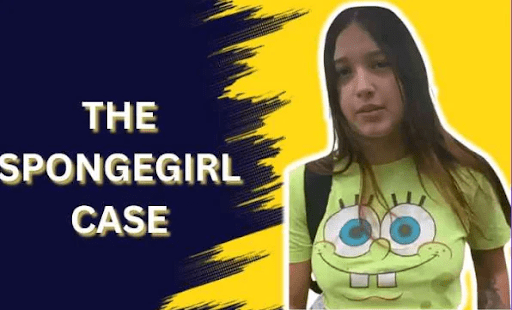The Spongegirl case has become emblematic of the complexities surrounding copyright infringement and intellectual property disputes in the entertainment industry. This article delves deep into the intricate details of the case, shedding light on its background, legal proceedings, and broader implications for content creators and copyright holders.
Introduction to Spongegirl Case
The Spongegirl case has captivated audiences worldwide, sparking heated debates and discussions about the ethical and legal dimensions of creative expression. At the heart of the controversy lies the allegation of copyright infringement, as the original creators of Spongegirl contend that their intellectual property rights have been violated.
The Rise of Spongegirl
Spongegirl, a beloved cartoon series, gained widespread acclaim for its endearing characters and captivating storylines. Created by a team of talented individuals, the show quickly garnered a devoted fanbase and achieved commercial success. However, amidst its popularity, allegations of copyright infringement cast a shadow over Spongegirl’s legacy.
Emergence of Allegations
The controversy surrounding Spongegirl erupted when it was revealed that certain elements of the show bore striking similarities to pre-existing works. Claims of plagiarism and intellectual property theft surfaced, prompting the original creators to take legal action against the production company responsible for Spongegirl.
Background of the Case
To understand the Spongegirl case fully, it is essential to delve into its background and the events leading up to the legal dispute. From the inception of the cartoon series to the unfolding of the legal proceedings, each aspect of the case contributes to its intricate narrative.
Creation of Spongegirl
Spongegirl was born out of the creative vision of its original creators, who poured their hearts and souls into crafting a world filled with whimsy and wonder. From character designs to plot developments, every aspect of the show was meticulously crafted to resonate with audiences of all ages.
Allegations of Copyright Infringement
The genesis of the legal dispute can be traced back to allegations of copyright infringement leveled against the production company behind Spongegirl. Accusations emerged that certain elements of the show were derivative of pre-existing works, raising questions about the originality and authenticity of Spongegirl’s content.
Legal Action
Faced with mounting evidence and public scrutiny, the original creators of Spongegirl made the difficult decision to pursue legal action against the production company. The ensuing legal battle would test the boundaries of copyright law and have far-reaching implications for the entertainment industry.
Key Players Involved
Central to the Spongegirl case are the key players whose actions and decisions have shaped its trajectory. From the creators of Spongegirl to the legal teams representing each side, each participant has played a crucial role in the unfolding drama.
The Spongegirl Creator
At the forefront of the legal dispute stands the creator of Spongegirl, whose artistic vision and intellectual property rights were at stake. Faced with the daunting task of defending their creative work, the Spongegirl creator became a symbol of resilience and determination in the face of adversity.
The Production Company
On the opposing side of the legal battle is the production company responsible for bringing Spongegirl to life on screen. With significant financial interests at stake, the production company mobilized its resources to defend against allegations of copyright infringement and protect its assets.
Legal Teams
Behind the scenes, legal teams representing each side engaged in fierce courtroom battles, advocating for their respective clients’ interests. Armed with expertise in copyright law and intellectual property rights, these legal professionals played a pivotal role in shaping the outcome of the case.
Allegations and Claims
The crux of the Spongegirl case revolves around the allegations of copyright infringement and intellectual property theft. These claims have sparked intense debates about the ethical and legal boundaries of creative expression in the entertainment industry.
Plagiarism and Intellectual Property Theft
Central to the allegations against the production company are accusations of plagiarism and intellectual property theft. Claimants argue that certain elements of Spongegirl were directly lifted from pre-existing works without proper attribution or authorization, constituting a clear violation of copyright law.
Analysis of Similarities
Experts tasked with analyzing the similarities between Spongegirl and the allegedly infringed works have identified numerous parallels in character designs, storylines, and thematic elements. These findings have bolstered the claimants’ case and raised serious questions about the originality of Spongegirl’s content.
Unauthorized Use
Another key aspect of the allegations involves the unauthorized use of copyrighted material within Spongegirl. It is alleged that the production company incorporated elements from pre-existing works into the show without obtaining the necessary licenses or permissions, further exacerbating the legal complexities surrounding the case.
Fair Use Considerations
The concept of fair use has emerged as a central point of contention in the Spongegirl case, with proponents arguing that certain uses of copyrighted material fall within the bounds of permissible use. However, opponents contend that the extensive borrowing of elements from pre-existing works exceeds the scope of fair use protections.
Legal Proceedings
The legal battle surrounding the Spongegirl case has unfolded in the courtroom, where both sides have presented their arguments and evidence before a judge and jury. The proceedings have been marked by intense scrutiny and meticulous examination of the facts and legal precedents.
Court Hearings
Courtroom hearings have provided a platform for legal experts to engage in rigorous debate over matters of copyright law and intellectual property rights. From expert witness testimonies to cross-examinations, each aspect of the proceedings has been carefully scrutinized in search of legal clarity.
Evidence Presentation
Key to the outcome of the case has been the presentation of evidence by both the plaintiffs and the defendants. Expert witnesses have been called upon to analyze the similarities and differences between Spongegirl and the allegedly infringed works, shedding light on the intricacies of copyright law.
Judicial Rulings
Ultimately, the fate of the Spongegirl case rests in the hands of the presiding judge, who must weigh the evidence and legal arguments before delivering a verdict. The rulings handed down by the court will have profound implications for the parties involved and set precedents for future copyright disputes.
Impact on Spongegirl Creator
The protracted legal battle has taken a toll on the creator of Spongegirl, who has endured significant emotional distress and financial strain throughout the proceedings. Beyond the immediate repercussions, the case has also had long-term implications for the creator’s reputation and creative autonomy.
Emotional Distress
The stress and anxiety of litigation have weighed heavily on the Spongegirl creator, who has faced the daunting task of defending their creative work against formidable legal challenges. The emotional toll of the case has tested the creator’s resilience and resolve in the face of adversity.
Financial Implications
In addition to the emotional toll, the Spongegirl case has also had significant financial implications for the creator. Legal fees, court costs, and potential damages awards have exacted a heavy financial burden, placing strain on the creator’s resources and livelihood.
Reputation Damage
Perhaps most damaging of all has been the impact of the case on the creator’s reputation within the entertainment industry. Accusations of copyright infringement and intellectual property theft have tarnished the creator’s professional standing, casting doubt on their integrity and creative integrity.
Public Reaction and Media Coverage
The Spongegirl case has generated widespread interest and speculation among the public and the media, with news outlets providing extensive coverage of the legal proceedings. Social media platforms have buzzed with discussions and debates, as audiences weigh in on the merits of the case and its broader implications.
Social Media Response
On social media platforms, reactions to the Spongegirl case have been mixed, with supporters and detractors voicing their opinions on the controversy. Hashtags and trending topics related to the case have sparked heated debates and discussions, as users express their views on the ethical and legal dimensions of the dispute.
News Coverage
News outlets have provided comprehensive coverage of the Spongegirl case, reporting on key developments and legal milestones as they unfold. From courtroom drama to expert analysis, media coverage has offered audiences insights into the complexities of the case and its potential ramifications.
Public Opinion
The Spongegirl case has divided public opinion, with some sympathizing with the creator’s plight and others questioning the legitimacy of the allegations. Op-eds and opinion pieces have explored the nuances of the case, as pundits and commentators offer their perspectives on the legal and ethical implications of the dispute.
Analysis of Copyright Laws
The Spongegirl case has prompted a reexamination of copyright laws and their application within the realm of creative expression. Legal experts and scholars have weighed in on the nuances of fair use, derivative works, and the boundaries of creative freedom in the digital age.
Fair Use Doctrine
Central to the legal arguments in the Spongegirl case is the concept of fair use, which allows for limited use of copyrighted material without the need for permission from the copyright holder. However, the application of fair use doctrine in the context of Spongegirl has sparked debate and controversy among legal scholars and practitioners.
Derivative Works
Another key aspect of the case involves the concept of derivative works, which are new works created from pre-existing material. The question of whether Spongegirl constitutes a derivative work of pre-existing works has been a focal point of the legal dispute, with implications for the broader interpretation of copyright law.
Creative Commons
The Spongegirl case has also raised questions about the role of Creative Commons licenses in governing the use of creative works. Advocates of Creative Commons argue that such licenses promote innovation and collaboration, while critics warn of the potential for abuse and exploitation of intellectual property rights.
Settlement and Resolution
After protracted legal battles and deliberations, the Spongegirl case reached a resolution through settlement negotiations between the parties involved. Terms of the agreement were reached, including compensation and the cessation of disputed practices, bringing an end to the contentious legal dispute.
Agreement Terms
The terms of the settlement agreement remain confidential, with details of the resolution not disclosed to the public. However, it is believed that the agreement included provisions for financial compensation, as well as assurances regarding the future use of copyrighted material.
Compensation
As part of the settlement, the parties involved likely agreed to a monetary settlement to resolve the legal dispute. The exact amount of compensation remains undisclosed, but it is expected to reflect the damages incurred by the original creators of Spongegirl as a result of the alleged copyright infringement.
Cease and Desist
In addition to financial compensation, the settlement agreement likely included provisions for the cessation of disputed practices, ensuring that future use of copyrighted material complies with applicable laws and regulations. This serves to protect the intellectual property rights of the original creators and prevent further legal disputes.
Lessons Learned
The Spongegirl case serves as a cautionary tale for content creators and copyright holders, highlighting the importance of protecting intellectual property rights and adhering to copyright laws. The case underscores the need for vigilance and diligence in safeguarding creative works from unauthorized use and exploitation.
Importance of Copyright Protection
One of the key takeaways from the Spongegirl case is the importance of copyright protection in the digital age. Content creators must take proactive measures to safeguard their intellectual property rights and prevent unauthorized use and reproduction of their work.
Legal Implications for Content Creators
The legal battle surrounding Spongegirl has shed light on the potential risks and liabilities faced by content creators in the entertainment industry. From copyright infringement claims to defamation lawsuits, creators must navigate a complex legal landscape to protect their creative endeavors.
Ethical Considerations
Beyond the legal implications, the Spongegirl case has sparked discussions about the ethical dimensions of creative expression and artistic integrity. Content creators must strike a balance between innovation and originality while respecting the intellectual property rights of others.
Conclusion
In conclusion, the Spongegirl case stands as a testament to the complexities and challenges inherent in the realm of intellectual property law. Through its legal proceedings and ultimate resolution, the case offers valuable insights into the intricacies of copyright disputes and the profound impact they can have on creators, audiences, and the broader entertainment industry. As the dust settles on this legal drama, the Spongegirl case serves as a reminder of the enduring importance of protecting intellectual property rights and upholding the principles of creative integrity and innovation.





